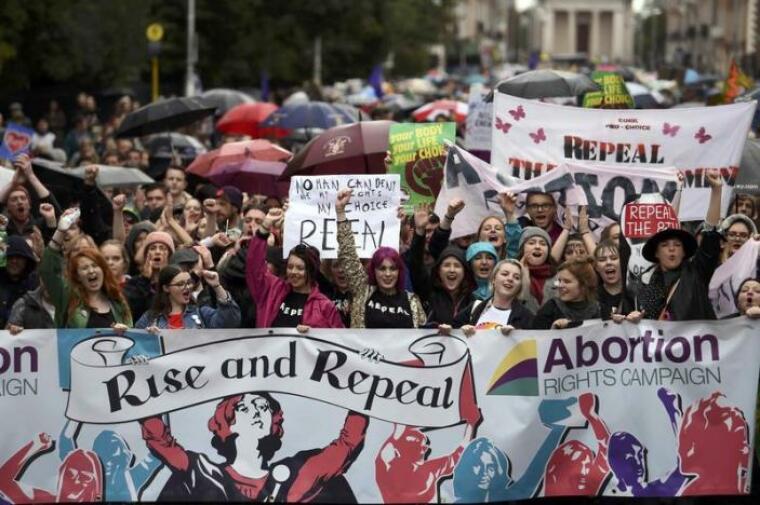Irish Supreme Court: State protections for unborn do not extend beyond right to life

Ireland's Supreme Court has unanimously ruled on Wednesday that unborn babies do not have inherent constitutional rights beyond the right to life enshrined in the country's Eighth Amendment.
In a landmark ruling, the seven-judge court has overturned a High Court decision last summer that affirmed the rights of the unborn child beyond the constitutionally protected right to life.
"The present constitutional rights for the unborn are confined to the right to life guaranteed in article 40.3.3 (the Eighth Amendment)," Chief Justice Frank Clarke told the Supreme Court, as reported by Sky News.
The Eighth Amendment of Ireland's Constitution enshrines the right to life of the unborn, rendering abortion illegal other than in exceptional circumstances.
Wednesday's ruling appears to clear the way for the government's abortion referendum that was planned for the end of May.
The referendum, proposed by the government in January, would allow voters to decide whether to repeal the Eighth Amendment and replace it with wording that would allow politicians to set the nation's abortion laws in the future.
Irish Prime Minister Leo Varadkar had decided to wait for the Supreme Court judgment in a case that was being appealed by the state before finalizing the exact wording and date of the referendum.
The case involved an immigration dispute in which a Nigerian national sought to revoke a 2008 deportation order, arguing that the unborn child being carried by his Irish partner had multiple rights, including the right to the company of the father.
The High Court agreed that the unborn enjoyed the rights beyond the right to life set out in the Eighth Amendment, prompting the state to appeal the ruling. The state had argued that the unborn only has the right to be born and all the other constitutional rights take effect at birth.
Varadkar had vowed that the government would introduce a measure that would allow unrestricted abortion in the first 12 weeks of pregnancy if the voters backed a change to the constitution through the May referendum.
If the Supreme Court had upheld the High Court decision, the referendum might have needed to be broadened to cover to account for other elements of the constitution, according to The Metro.
"Today the Supreme Court made a landmark decision," said Sen. Catherine Noone. "This judgment will allow us to move forward to a May referendum on the Eighth Amendment," she added.
The Supreme Court ruling has been decried by the pro-life group Society for the Protection of Unborn Children (SPUC).
"This perverse ruling makes it abundantly clear that if Article 40.3.3 is repealed unborn babies will not only lose their current constitutional protection but will be exposed to abortion on demand up to birth," said Pat Buckley, SPUC's Republic of Ireland officer.
"We must all redouble our efforts to ensure that the 8th Amendment is retained and that unborn babies are properly protected," he added.
 Christians don't have to affirm transgenderism, but they can’t express that view at work: tribunal
Christians don't have to affirm transgenderism, but they can’t express that view at work: tribunal Archaeology discovery: Medieval Christian prayer beads found on Holy Island
Archaeology discovery: Medieval Christian prayer beads found on Holy Island Presbyterian Church in America votes to leave National Association of Evangelicals
Presbyterian Church in America votes to leave National Association of Evangelicals Over 50 killed in 'vile and satanic' attack at Nigerian church on Pentecost Sunday
Over 50 killed in 'vile and satanic' attack at Nigerian church on Pentecost Sunday Ukrainian Orthodox Church severs ties with Moscow over Patriarch Kirill's support for Putin's war
Ukrainian Orthodox Church severs ties with Moscow over Patriarch Kirill's support for Putin's war Islamic State kills 20 Nigerian Christians as revenge for US airstrike
Islamic State kills 20 Nigerian Christians as revenge for US airstrike Man who served 33 years in prison for murder leads inmates to Christ
Man who served 33 years in prison for murder leads inmates to Christ


 Nigerian student beaten to death, body burned over ‘blasphemous’ WhatsApp message
Nigerian student beaten to death, body burned over ‘blasphemous’ WhatsApp message 'A new low': World reacts after Hong Kong arrests 90-year-old Cardinal Joseph Zen
'A new low': World reacts after Hong Kong arrests 90-year-old Cardinal Joseph Zen Iran sentences Christian man to 10 years in prison for hosting house church worship gathering
Iran sentences Christian man to 10 years in prison for hosting house church worship gathering French Guyana: Pastor shot dead, church set on fire after meeting delegation of Evangelicals
French Guyana: Pastor shot dead, church set on fire after meeting delegation of Evangelicals ‘Talking Jesus’ report finds only 6% of UK adults identify as practicing Christians
‘Talking Jesus’ report finds only 6% of UK adults identify as practicing Christians Mission Eurasia ministry center blown up in Ukraine, hundreds of Bibles destroyed: 'God will provide'
Mission Eurasia ministry center blown up in Ukraine, hundreds of Bibles destroyed: 'God will provide' Church holds service for first time after ISIS desecrated it 8 years ago
Church holds service for first time after ISIS desecrated it 8 years ago Burger King apologizes for 'offensive campaign' using Jesus' words at the Last Supper
Burger King apologizes for 'offensive campaign' using Jesus' words at the Last Supper Uganda: Muslims abduct teacher, burn him inside mosque for praying in Christ’s name
Uganda: Muslims abduct teacher, burn him inside mosque for praying in Christ’s name